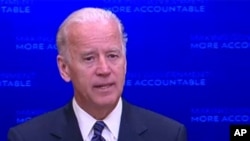U.S. Vice President Joe Biden is holding his eighth session Wednesday with a bipartisan committee of lawmakers to work on a plan for reducing the nation's budget deficit.
Biden and the members of Congress are trying to negotiate how much and what spending could be cut to accompany a needed increase to the country's debt limit. Wednesday's meeting is their second this week, and they will hold another on Thursday.
After their talks on Tuesday, Biden said the group, which began meeting on May 5, is down to the "tough stuff" now.
Republicans, who control the House of Representatives, have said they will not approve an increase to the debt limit unless the president makes sharp budget cuts.
The current legal borrowing limit of $14.3 trillion was reached last month. U.S. officials say emergency measures will allow them to continue making payments on the entire current debt only until August 2.
On Tuesday, Federal Reserve Chairman Benjamin Bernanke said politicians must not allow the government to default on its loans, saying even a short-term break in payments could cause "severe disruptions" in financial markets.
The head of the U.S. central bank said the "debt ceiling" should not be used as a bargaining chip to force the government to reduce its spending deficit.
In his speech Tuesday, Bernanke said reducing the deficit is an important long-term goal. But he said in the meantime, Congress must allow the government to continue borrowing to meet its obligations or risk damaging the country's credit rating, damaging the special role of the dollar in global markets, and causing an increase in interest rates, which would make future debt payments even higher.
Bernanke's concerns echo warnings by other officials and economic figures.
A major global credit rating agency, Fitch, recently said failing to raise the debt limit would be a "crisis of governance" that would threaten the "fragile financial stability" in the United States and the rest of the world.
Treasury Secretary Timothy Geithner has also warned the U.S. could face "catastrophic consequences" if lawmakers fail to raise the debt limit.
But some Republicans argue loan payments could be made without raising the debt limit and other obligations can be delayed or cut without triggering a crisis.
Some information for this report was provided by AP and AFP.




